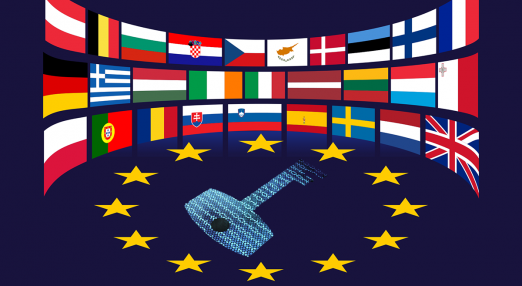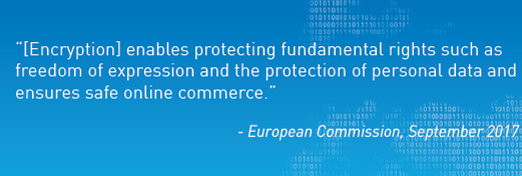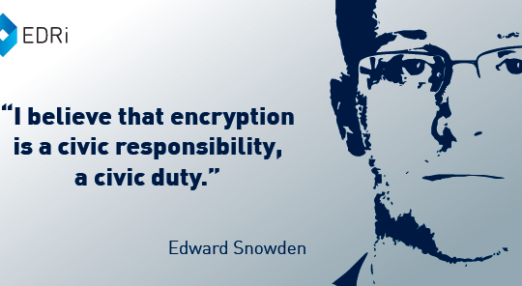encryption
Filter by...
-

Germany asks what should the EU do about encryption for law enforcement?
On 22 September, Statewatch released a document issued by the German Presidency of the Council to help establish a common EU position on finding ways around encrypted communications for the needs of law enforcement.
Read more
-

Keep private communications private
On 27 July, the European Commission published a Communication on a EU strategy for a more effective fight against child sexual abuse material (CSAM). The Communication indicates that messaging services (WhatsApp, Facebook Messenger…) may see their privacy protections undermined under new legislation that will be proposed this week.
Read more
-

Web browser privacy: ARTICLE 19 welcomes initiatives to protect users
There are widespread web tracking practices that undermine users’ human rights. However, safeguards against web tracking can and are being deployed by various service providers. EDRi member ARTICLE 19, and more generally EDRi as a whole, support these initiatives to protect user privacy and anonymity as part of a wider shift toward a more rights-respecting sector.
Read more
-

Why weak encryption is everybody’s problem
Representatives of the UK Home Department, US Attorney General, US Homeland Security and Australian Home Affairs have joined forces to issue an open letter to Mark Zuckerberg. In their letter of 4 October, they urge Facebook to halt plans for end-to-end (aka strong) encryption across Facebook’s messaging platforms, unless such plans include “a means for […]
Read more
-

High time: Policy makers increasingly embrace encryption
Encryption is of critical importance to our democracy and rule of law. Nevertheless, politicians frequently advocate for weakening this technology. Slowly but surely, however, policy makers seem to start embracing it.
Read more
-

The European Commission struggles to find a position on encryption
On 18 October, the European Commission adopted some form of position on encryption, inexplicably embedded in its “anti-terrorism package”. Home affairs activity in relation to encryption is horizontal (covering all illegal activity) and not specifically related to terrorism. However, the Commission chose to include this topic in its anti-terrorism package. The decision to publish the […]
Read more
-

Privacy Camp 2018: Speech, settings and [in]security by design
Join us for the 6th annual Privacy Camp! Privacy Camp will take place on 23 January 2018 in Brussels, Belgium, just before the start of the CPDP conference. Privacy Camp brings together civil society, policy-makers and academia to discuss existing and looming problems for human rights in the digital environment. In the face of a […]
Read more
-

EU’s plans on encryption: What is needed?
On 18 October 2017, the European Commission is expected to publish a Communication on counter-terrorism, which will include some lines on encryption. What is encryption? Why is it important? When we send an encrypted message (or store an encrypted document), no one else but the intended recipient can read it using a unique key. So […]
Read more
-

Position Paper: Encryption workarounds and human rights
On 12 September, EDRi published the position paper “Encryption Workarounds: a digital rights perspective”. It was published in response to the European Commission’s expert consultation exercise around the Encryption Workarounds paper by Orin Kerr and Bruce Schneier.
Read more
-

Dutch digital investigation: Pushing the boundaries of legality
The Dutch court is currently considering the case against Naoufal F, in which the police made use of several advanced digital investigation methods that challenge the boundaries of the law. A key issue in the case is the way in which the police gained access to and analysed the secure communication of suspects. Inez Weski, […]
Read more
-

Secret documents reveal: BND attacked Tor and advises not to use it
The German spy agency BND developed a system to monitor the anonymity network Tor and warned federal agencies that its anonymity is “ineffective”. This is what emerges from a series of secret documents published by the German Netzpolitik blog. The spies handed a prototype of this technology over to the US National Security Agency (NSA), […]
Read more
-

Commission Report on child protection online lacks facts and evidence
In December 2016, the European Commission issued two reports on the implementation of the Directive on combating the sexual abuse and sexual exploitation of children and child pornography (Child Exploitation Directive, 2011/92/EU): a general report and a specific report about Article 25 of the Directive, which covers removal and blocking of child abuse, child exploitation and child […]
Read more
